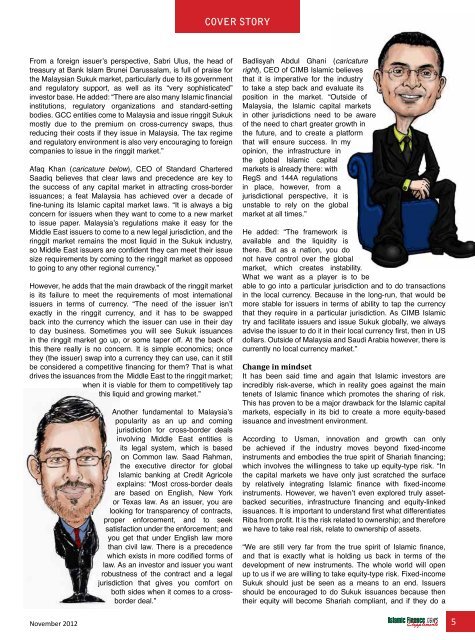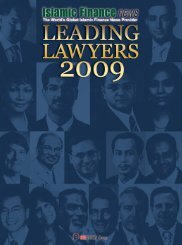Sukuk & Capital Market - Islamic Finance News
Sukuk & Capital Market - Islamic Finance News
Sukuk & Capital Market - Islamic Finance News
Create successful ePaper yourself
Turn your PDF publications into a flip-book with our unique Google optimized e-Paper software.
Cover story<br />
From a foreign issuer’s perspective, Sabri Ulus, the head of<br />
treasury at Bank Islam Brunei Darussalam, is full of praise for<br />
the Malaysian <strong>Sukuk</strong> market, particularly due to its government<br />
and regulatory support, as well as its “very sophisticated”<br />
investor base. He added: “There are also many <strong>Islamic</strong> financial<br />
institutions, regulatory organizations and standard-setting<br />
bodies. GCC entities come to Malaysia and issue ringgit <strong>Sukuk</strong><br />
mostly due to the premium on cross-currency swaps, thus<br />
reducing their costs if they issue in Malaysia. The tax regime<br />
and regulatory environment is also very encouraging to foreign<br />
companies to issue in the ringgit market.”<br />
Afaq Khan (caricature below), CEO of Standard Chartered<br />
Saadiq believes that clear laws and precedence are key to<br />
the success of any capital market in attracting cross-border<br />
issuances; a feat Malaysia has achieved over a decade of<br />
fine-tuning its <strong>Islamic</strong> capital market laws. “It is always a big<br />
concern for issuers when they want to come to a new market<br />
to issue paper. Malaysia’s regulations make it easy for the<br />
Middle East issuers to come to a new legal jurisdiction, and the<br />
ringgit market remains the most liquid in the <strong>Sukuk</strong> industry,<br />
so Middle East issuers are confident they can meet their issue<br />
size requirements by coming to the ringgit market as opposed<br />
to going to any other regional currency.”<br />
However, he adds that the main drawback of the ringgit market<br />
is its failure to meet the requirements of most international<br />
issuers in terms of currency. “The need of the issuer isn’t<br />
exactly in the ringgit currency, and it has to be swapped<br />
back into the currency which the issuer can use in their day<br />
to day business. Sometimes you will see <strong>Sukuk</strong> issuances<br />
in the ringgit market go up, or some taper off. At the back of<br />
this there really is no concern. It is simple economics; once<br />
they (the issuer) swap into a currency they can use, can it still<br />
be considered a competitive financing for them? That is what<br />
drives the issuances from the Middle East to the ringgit market;<br />
when it is viable for them to competitively tap<br />
this liquid and growing market.”<br />
Another fundamental to Malaysia’s<br />
popularity as an up and coming<br />
jurisdiction for cross-border deals<br />
involving Middle East entities is<br />
its legal system, which is based<br />
on Common law. Saad Rahman,<br />
the executive director for global<br />
<strong>Islamic</strong> banking at Credit Agricole<br />
explains: “Most cross-border deals<br />
are based on English, New York<br />
or Texas law. As an issuer, you are<br />
looking for transparency of contracts,<br />
proper enforcement, and to seek<br />
satisfaction under the enforcement; and<br />
you get that under English law more<br />
than civil law. There is a precedence<br />
which exists in more codified forms of<br />
law. As an investor and issuer you want<br />
robustness of the contract and a legal<br />
jurisdiction that gives you comfort on<br />
both sides when it comes to a crossborder<br />
deal.”<br />
Badlisyah Abdul Ghani (caricature<br />
right), CEO of CIMB <strong>Islamic</strong> believes<br />
that it is imperative for the industry<br />
to take a step back and evaluate its<br />
position in the market. “Outside of<br />
Malaysia, the <strong>Islamic</strong> capital markets<br />
in other jurisdictions need to be aware<br />
of the need to chart greater growth in<br />
the future, and to create a platform<br />
that will ensure success. In my<br />
opinion, the infrastructure in<br />
the global <strong>Islamic</strong> capital<br />
markets is already there: with<br />
RegS and 144A regulations<br />
in place, however, from a<br />
jurisdictional perspective, it is<br />
unstable to rely on the global<br />
market at all times.”<br />
He added: “The framework is<br />
available and the liquidity is<br />
there. But as a nation, you do<br />
not have control over the global<br />
market, which creates instability.<br />
What we want as a player is to be<br />
able to go into a particular jurisdiction and to do transactions<br />
in the local currency. Because in the long-run, that would be<br />
more stable for issuers in terms of ability to tap the currency<br />
that they require in a particular jurisdiction. As CIMB <strong>Islamic</strong><br />
try and facilitate issuers and issue <strong>Sukuk</strong> globally, we always<br />
advise the issuer to do it in their local currency first, then in US<br />
dollars. Outside of Malaysia and Saudi Arabia however, there is<br />
currently no local currency market.”<br />
Change in mindset<br />
It has been said time and again that <strong>Islamic</strong> investors are<br />
incredibly risk-averse, which in reality goes against the main<br />
tenets of <strong>Islamic</strong> finance which promotes the sharing of risk.<br />
This has proven to be a major drawback for the <strong>Islamic</strong> capital<br />
markets, especially in its bid to create a more equity-based<br />
issuance and investment environment.<br />
According to Usman, innovation and growth can only<br />
be achieved if the industry moves beyond fixed-income<br />
instruments and embodies the true spirit of Shariah financing;<br />
which involves the willingness to take up equity-type risk. “In<br />
the capital markets we have only just scratched the surface<br />
by relatively integrating <strong>Islamic</strong> finance with fixed-income<br />
instruments. However, we haven’t even explored truly assetbacked<br />
securities, infrastructure financing and equity-linked<br />
issuances. It is important to understand first what differentiates<br />
Riba from profit. It is the risk related to ownership; and therefore<br />
we have to take real risk, relate to ownership of assets.<br />
“We are still very far from the true spirit of <strong>Islamic</strong> finance,<br />
and that is exactly what is holding us back in terms of the<br />
development of new instruments. The whole world will open<br />
up to us if we are willing to take equity-type risk. Fixed-income<br />
<strong>Sukuk</strong> should just be seen as a means to an end. Issuers<br />
should be encouraged to do <strong>Sukuk</strong> issuances because then<br />
their equity will become Shariah compliant, and if they do a<br />
November 2012 5

















